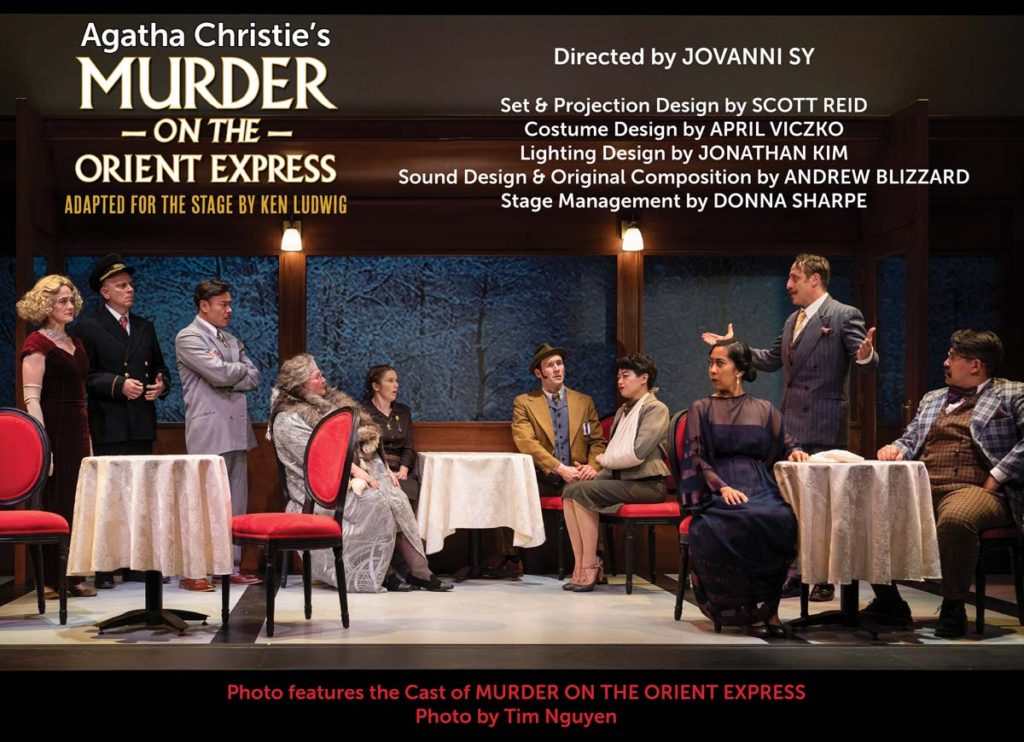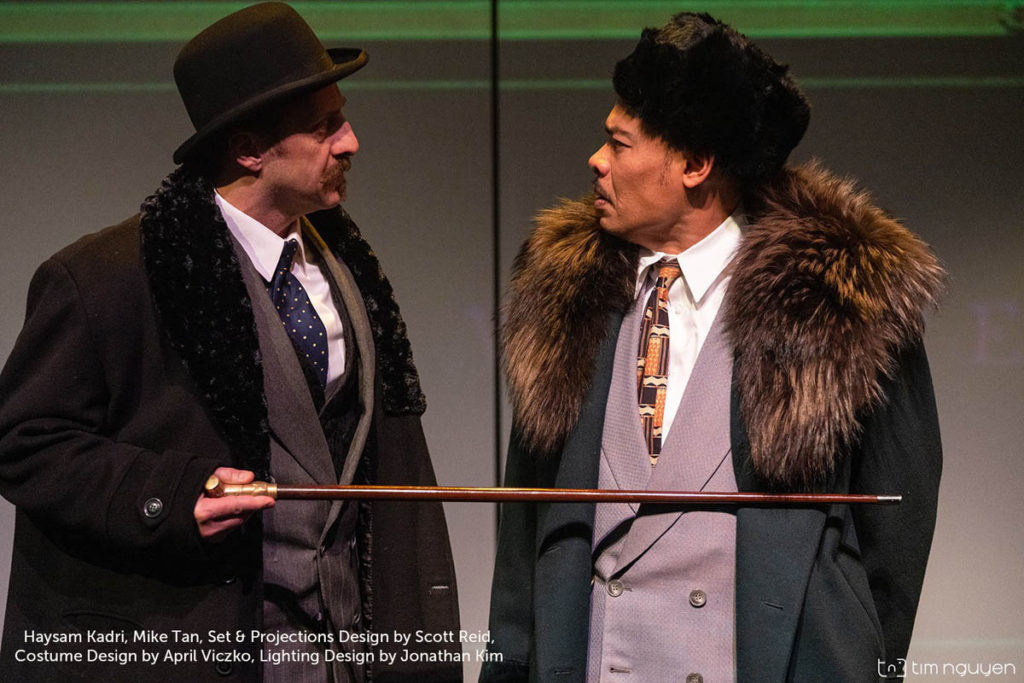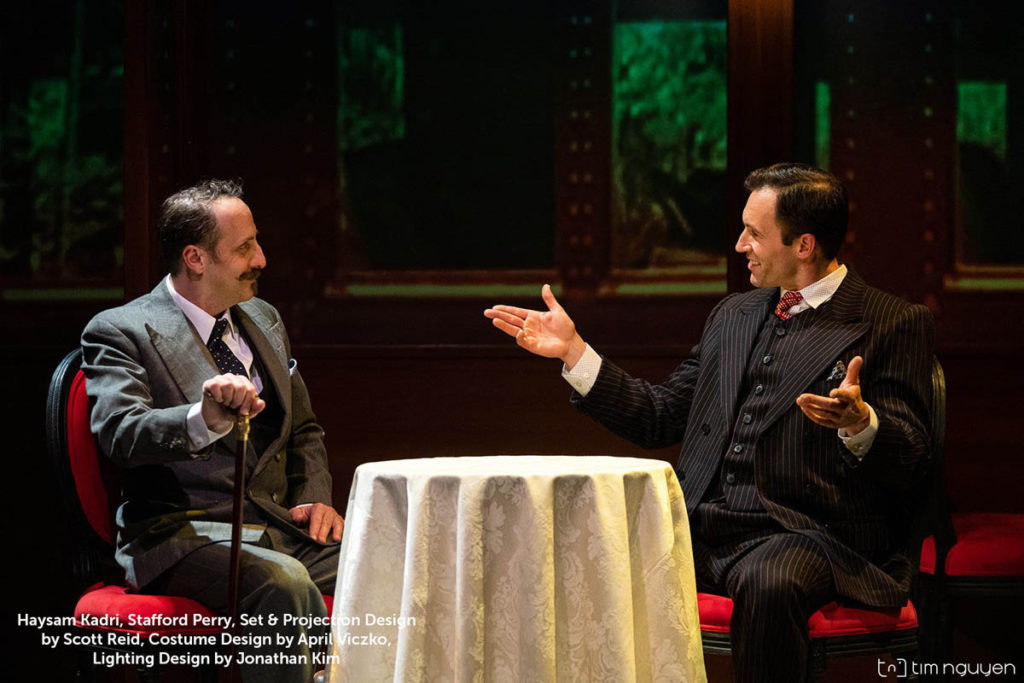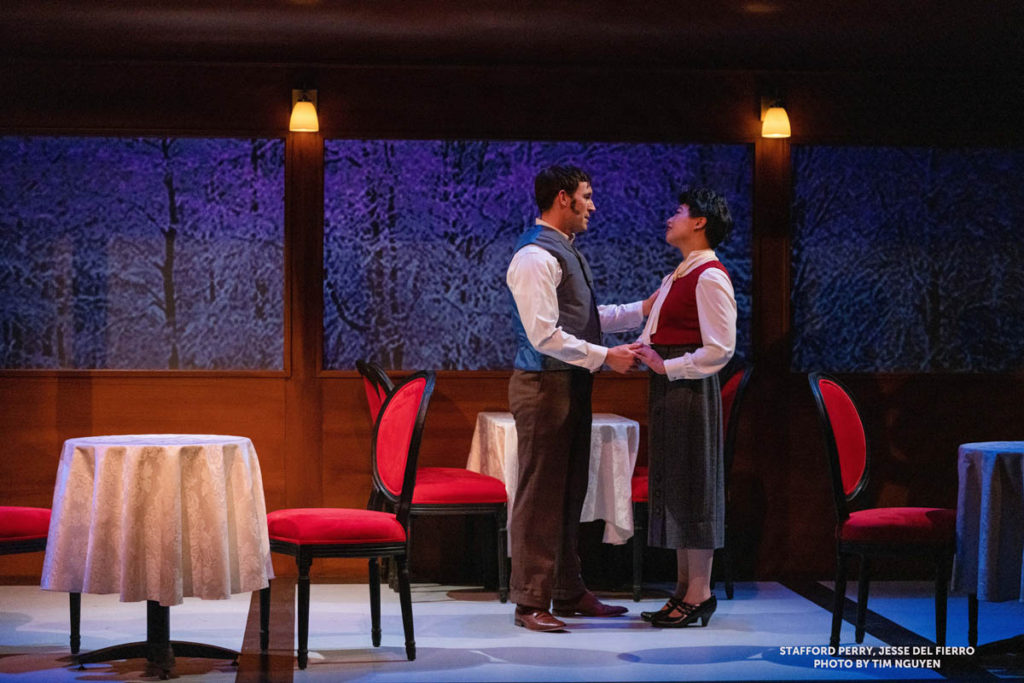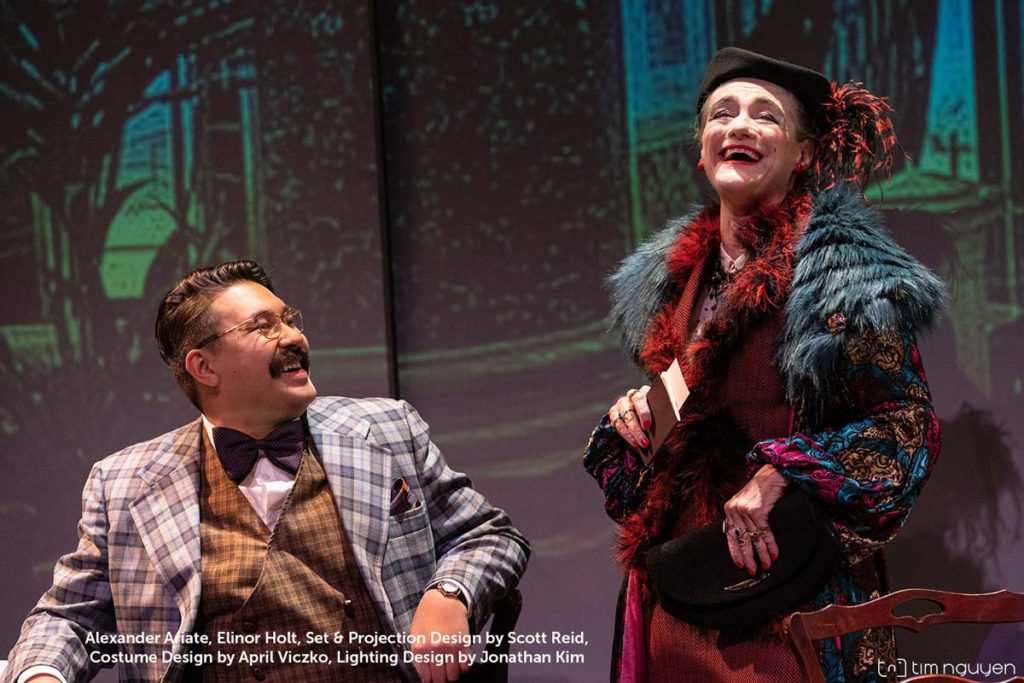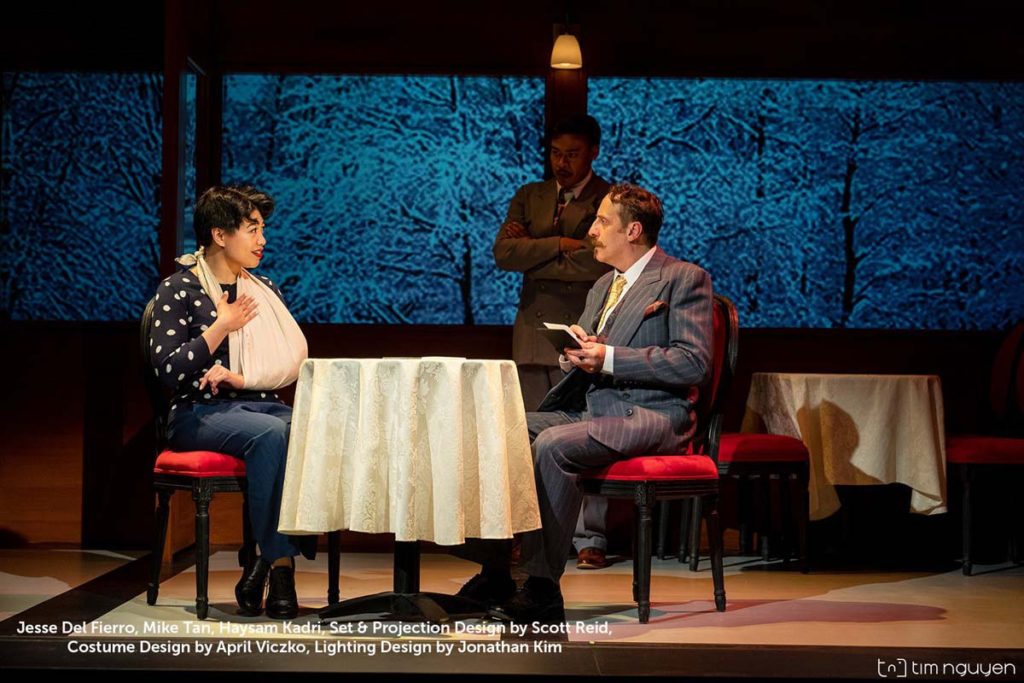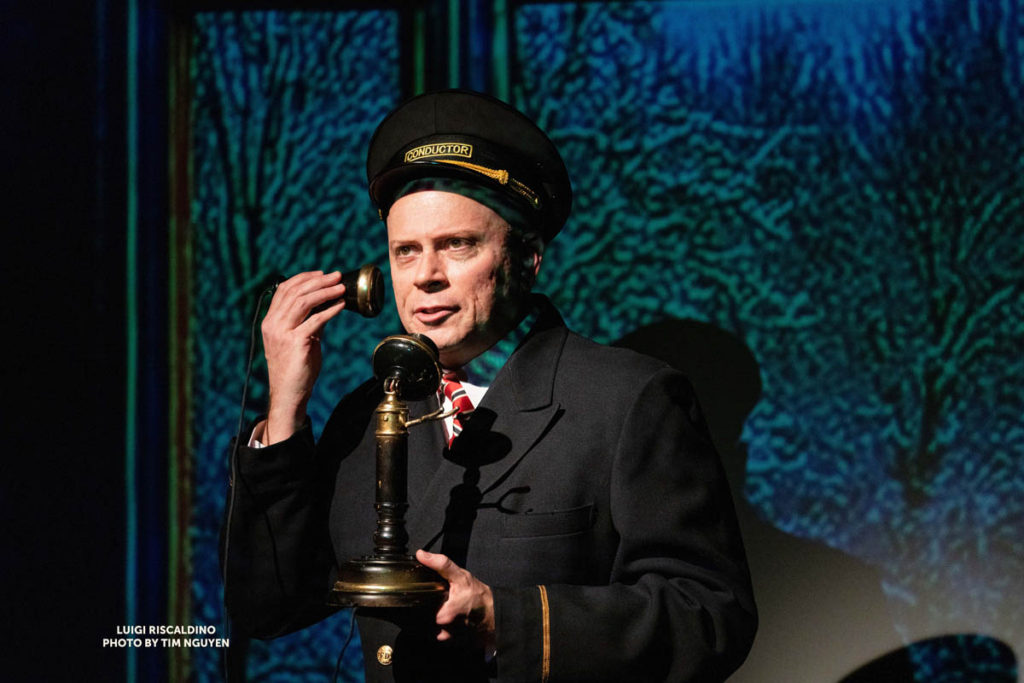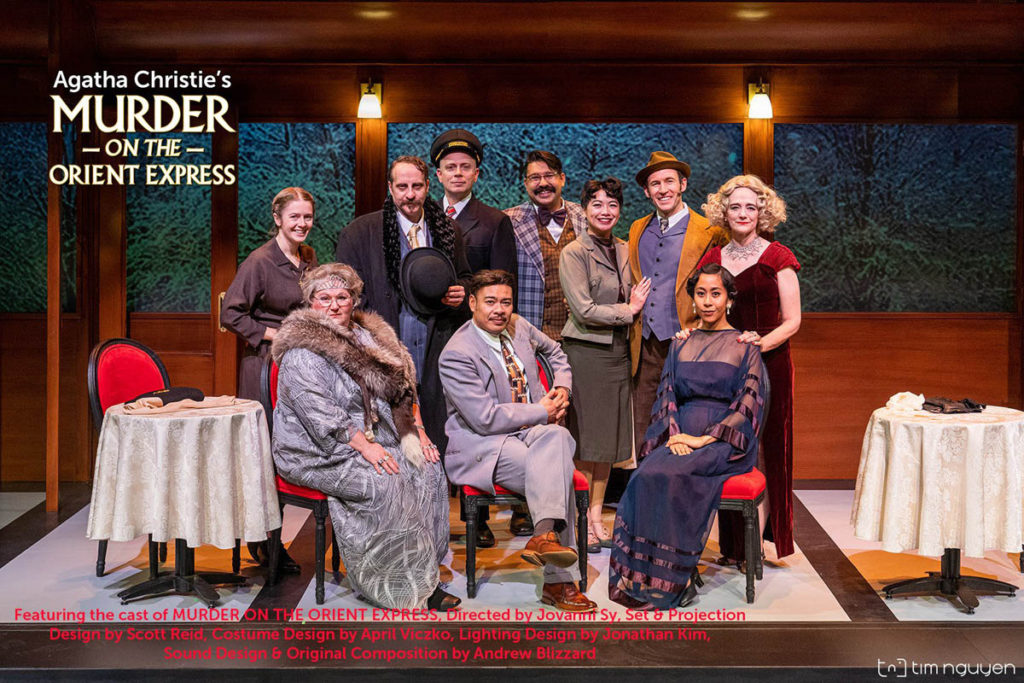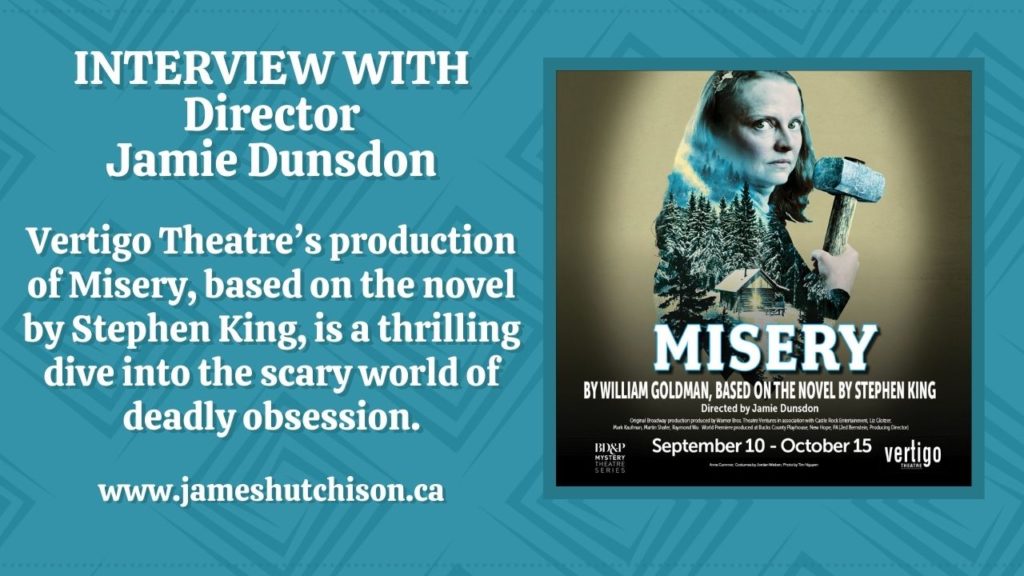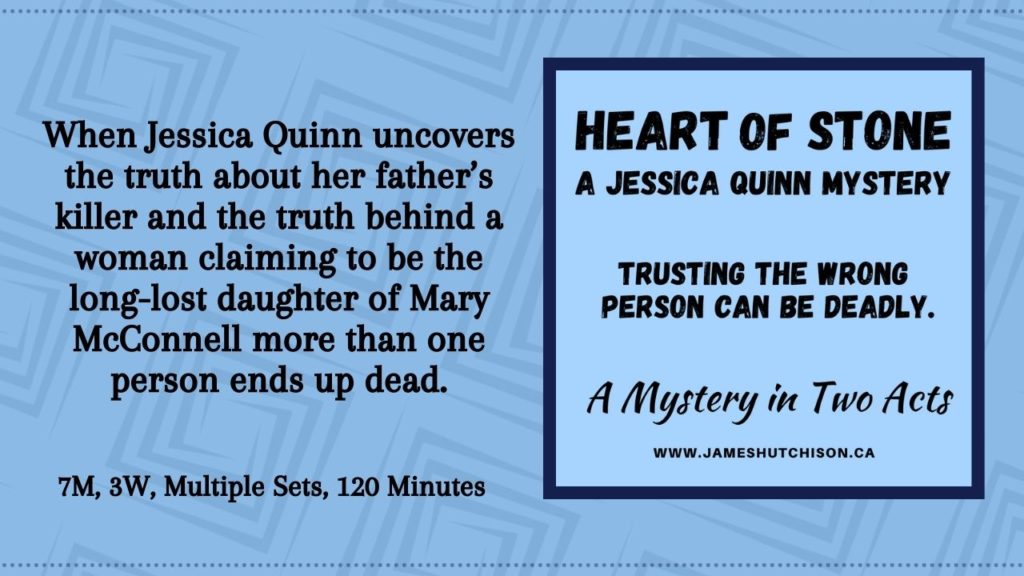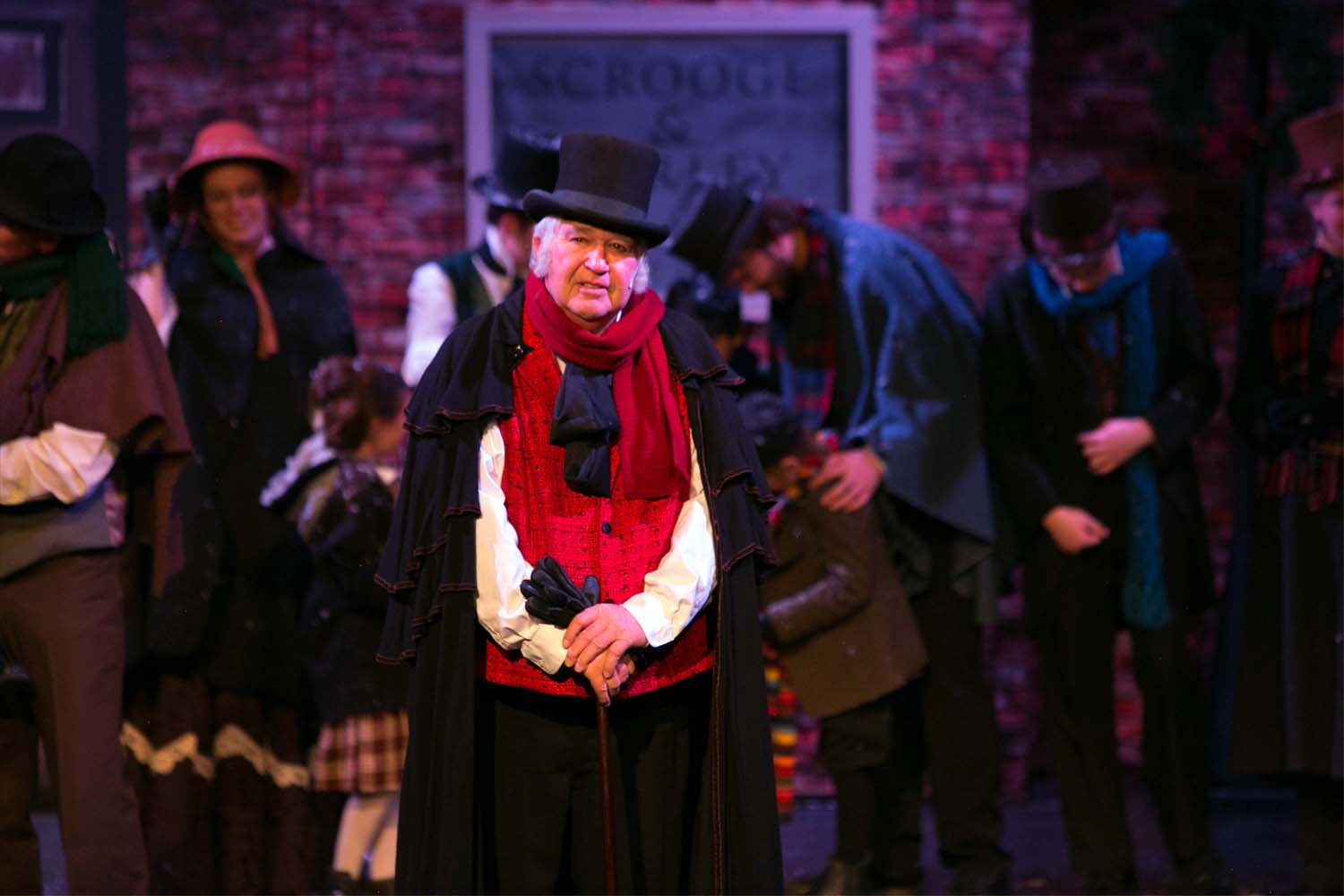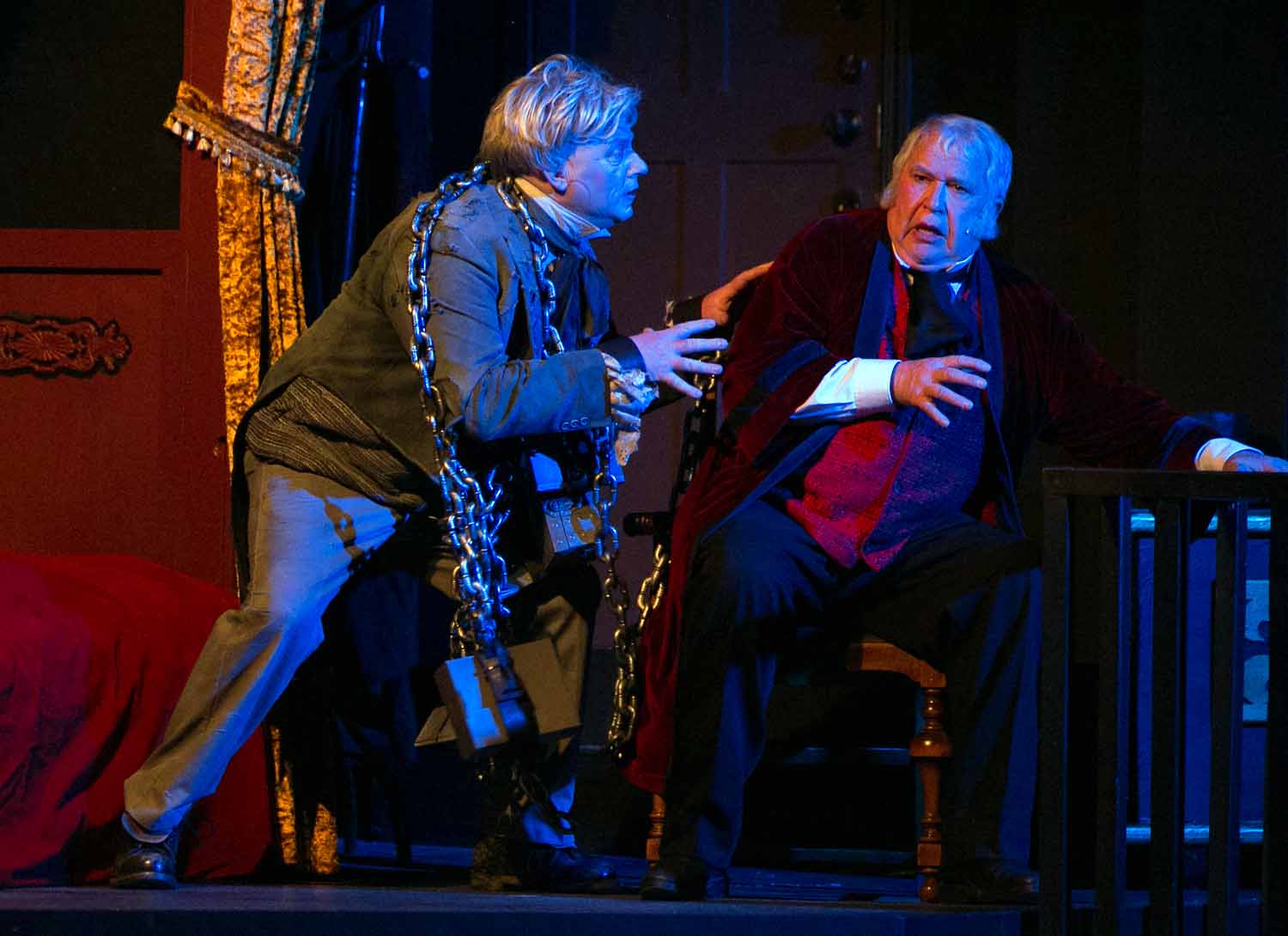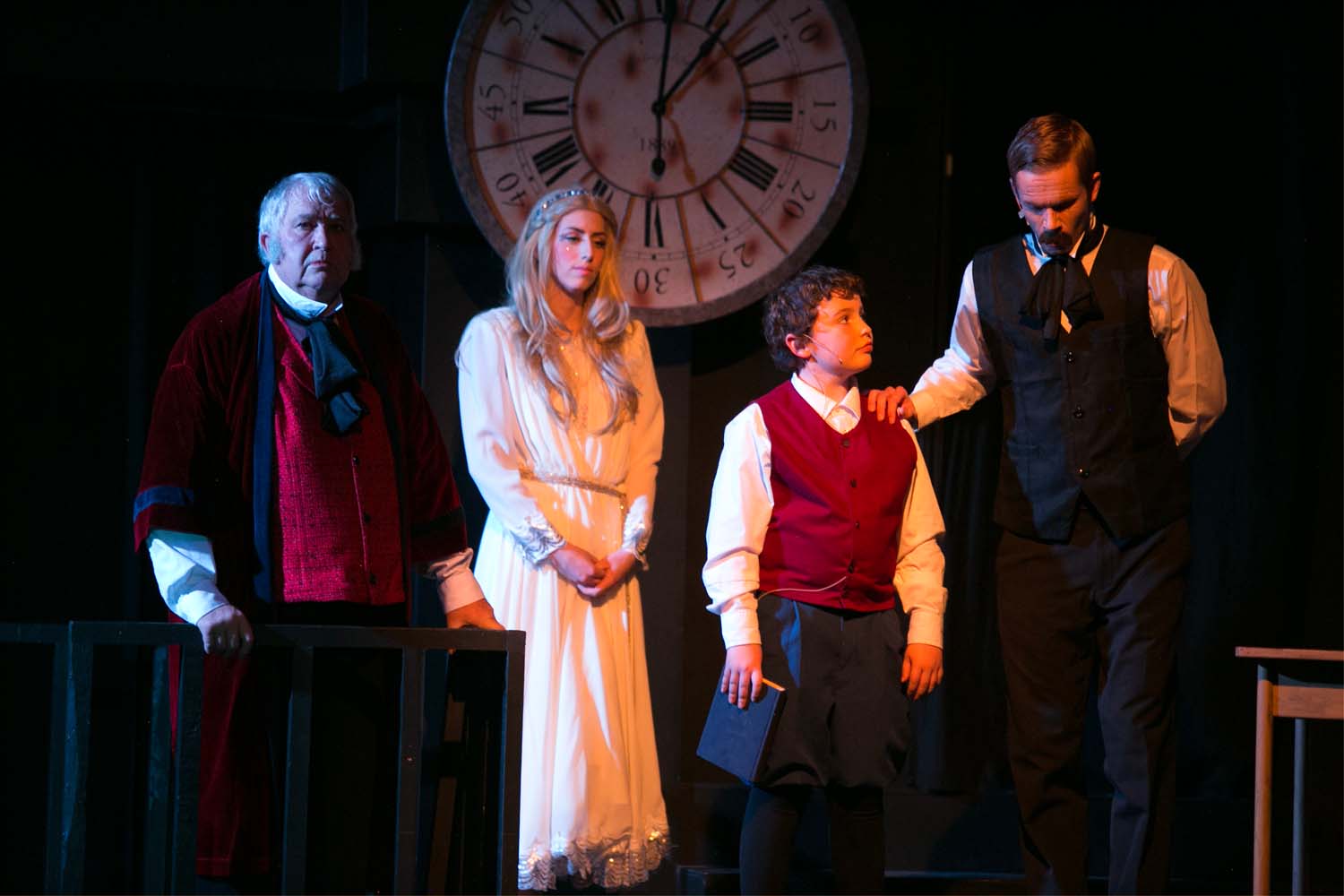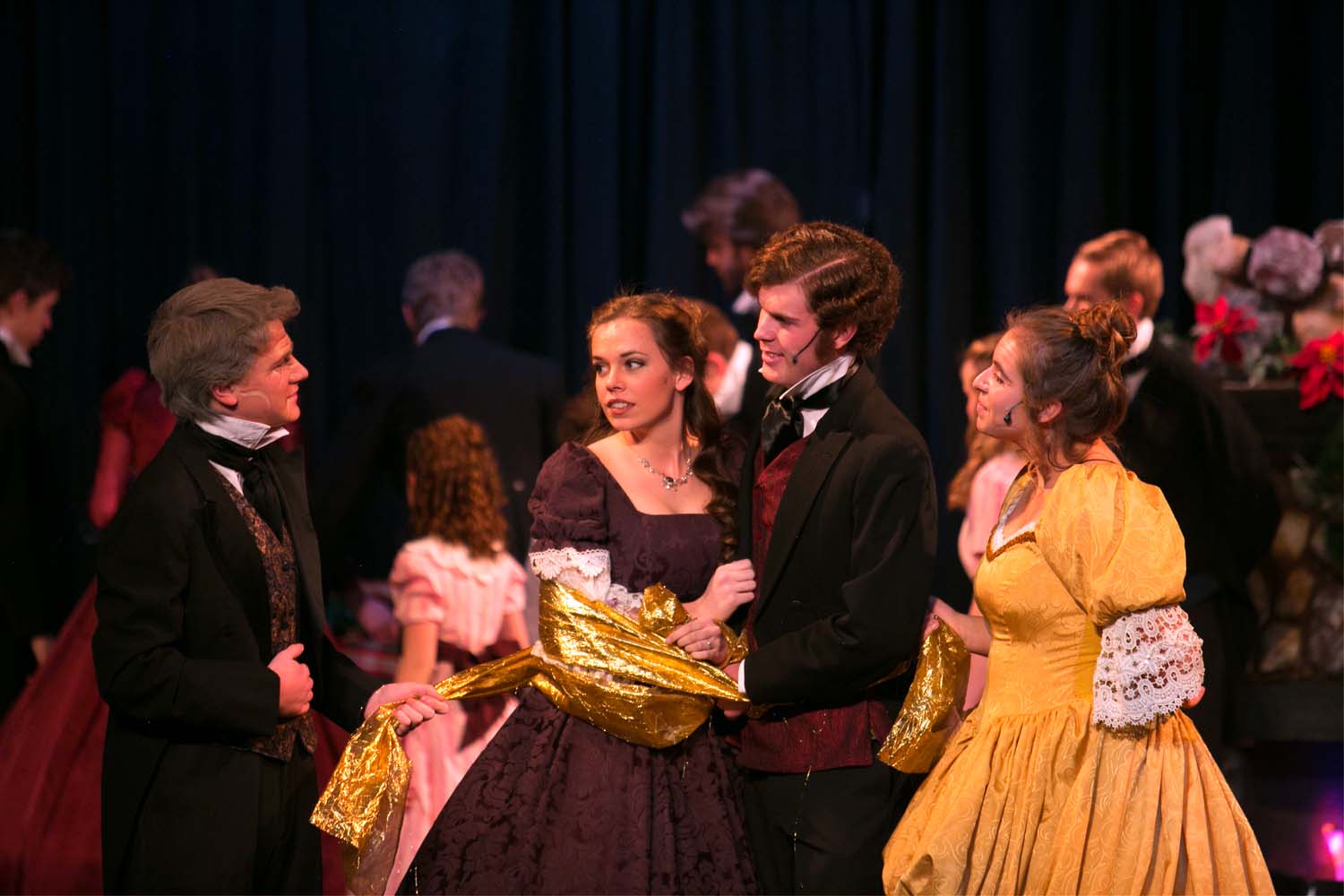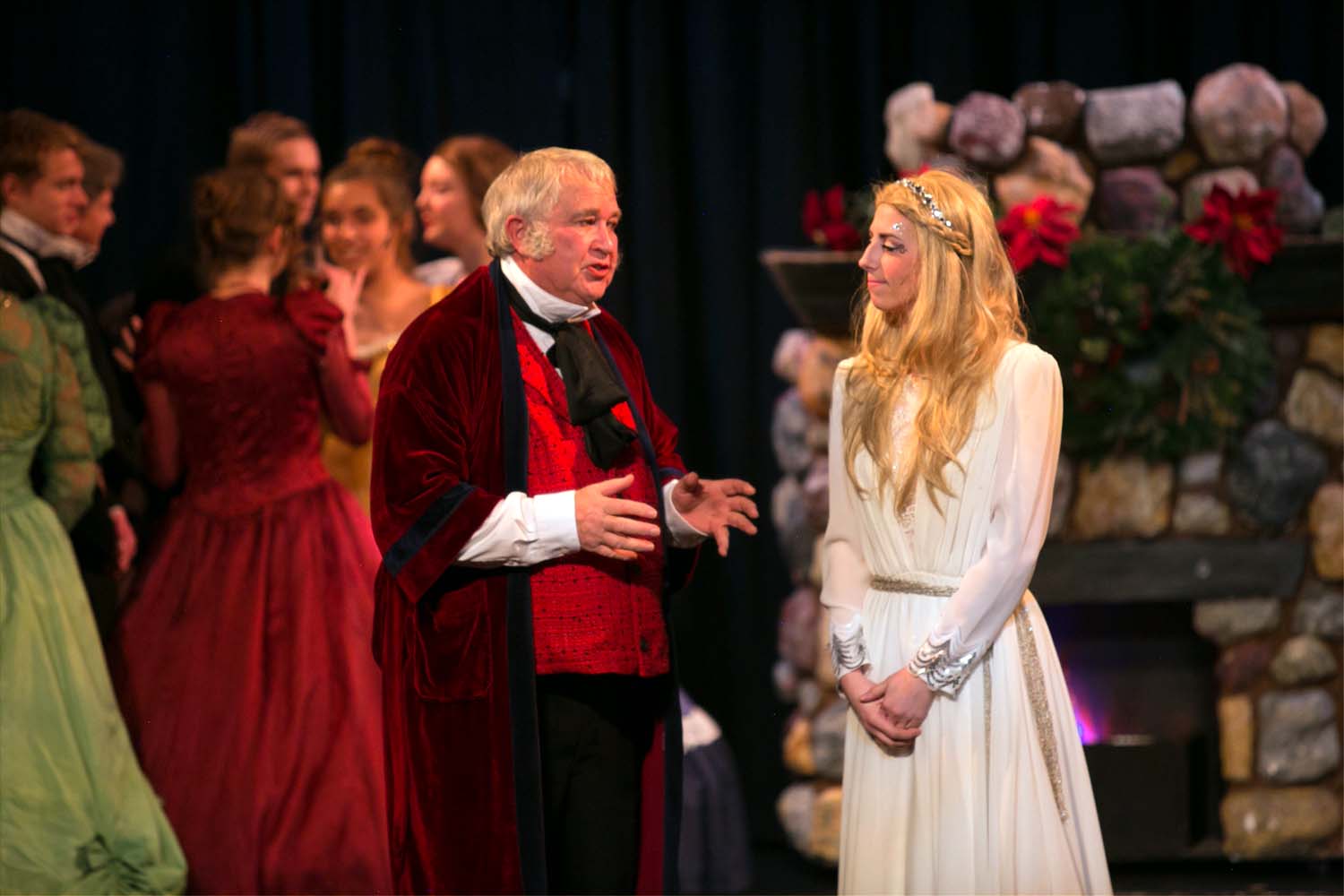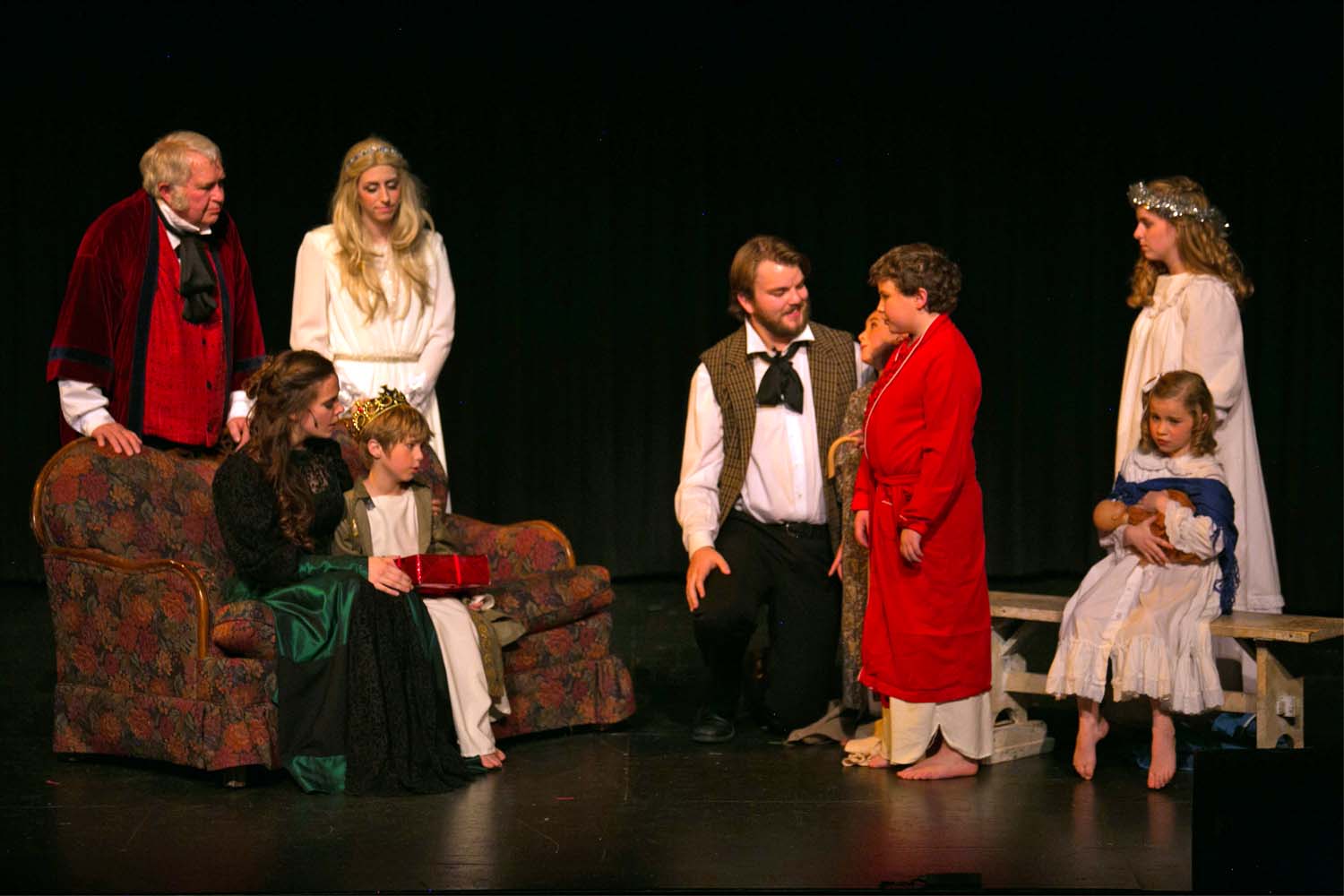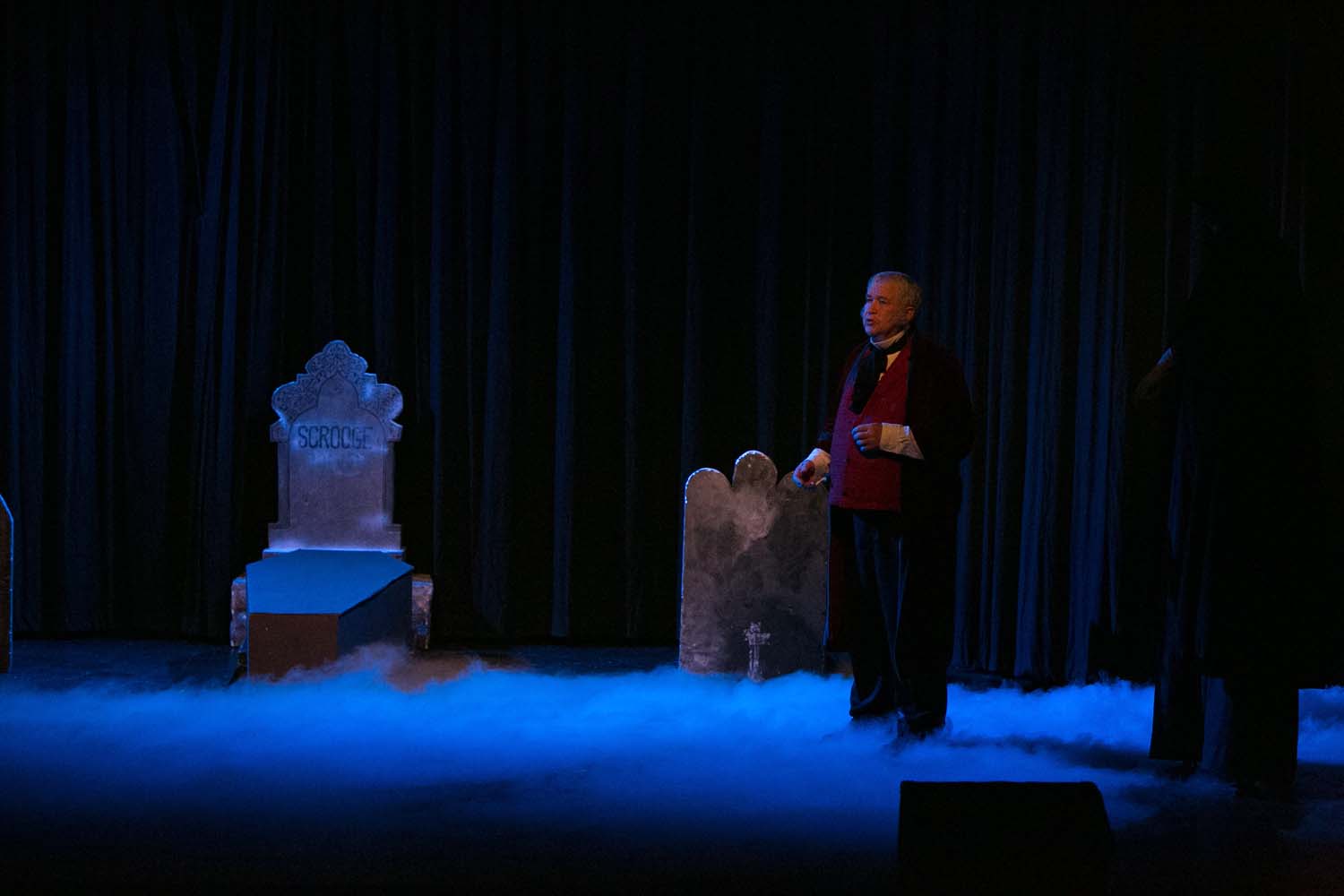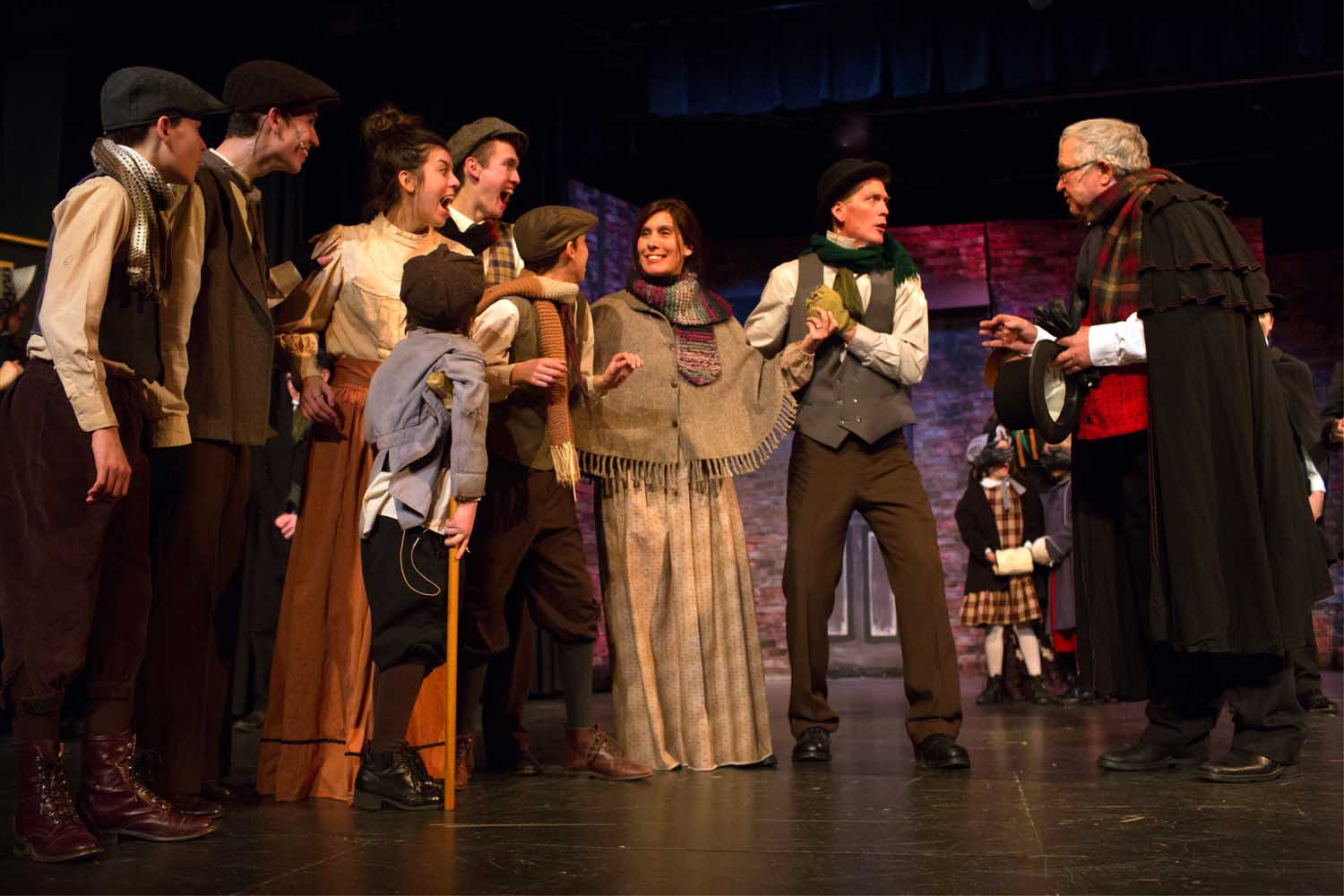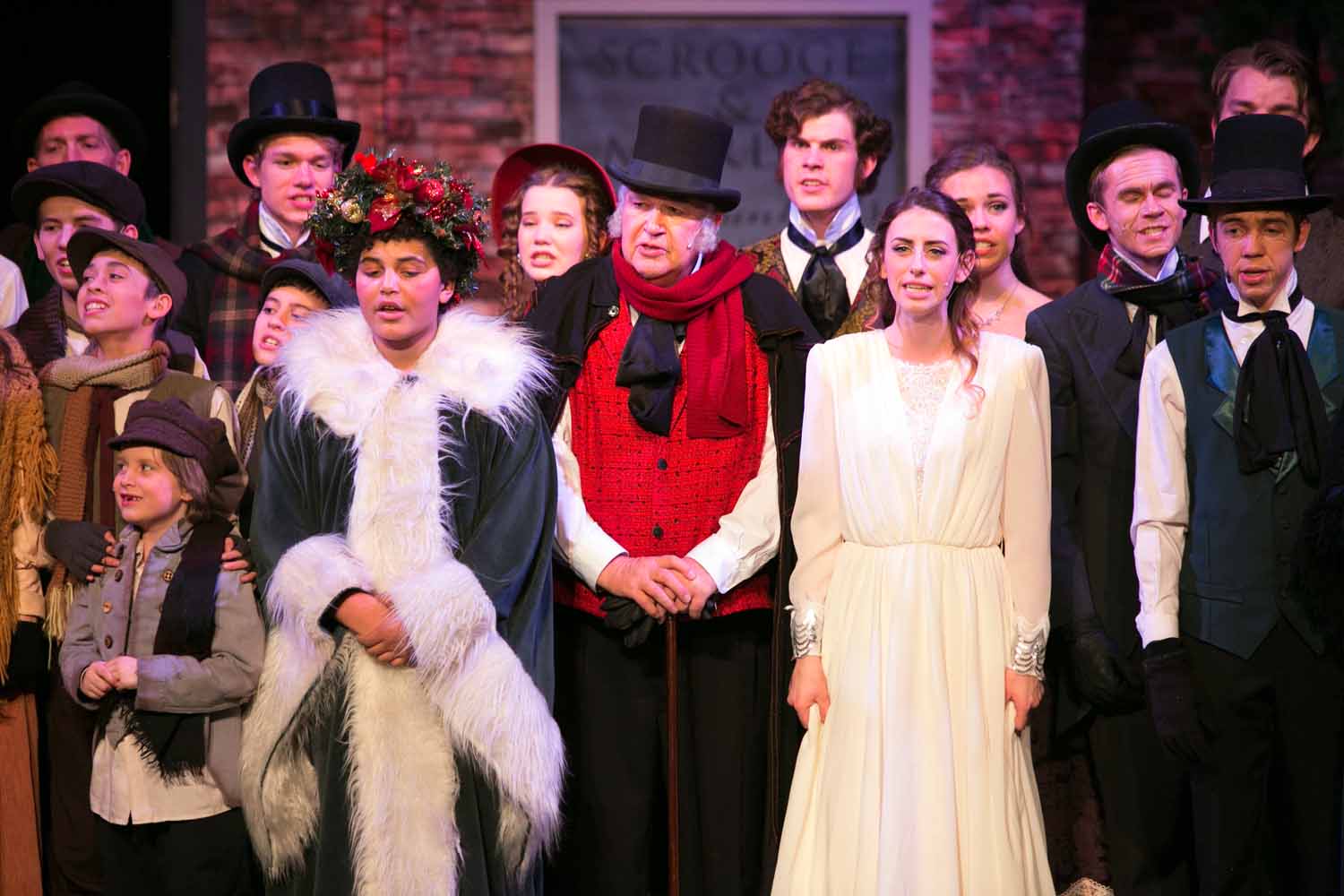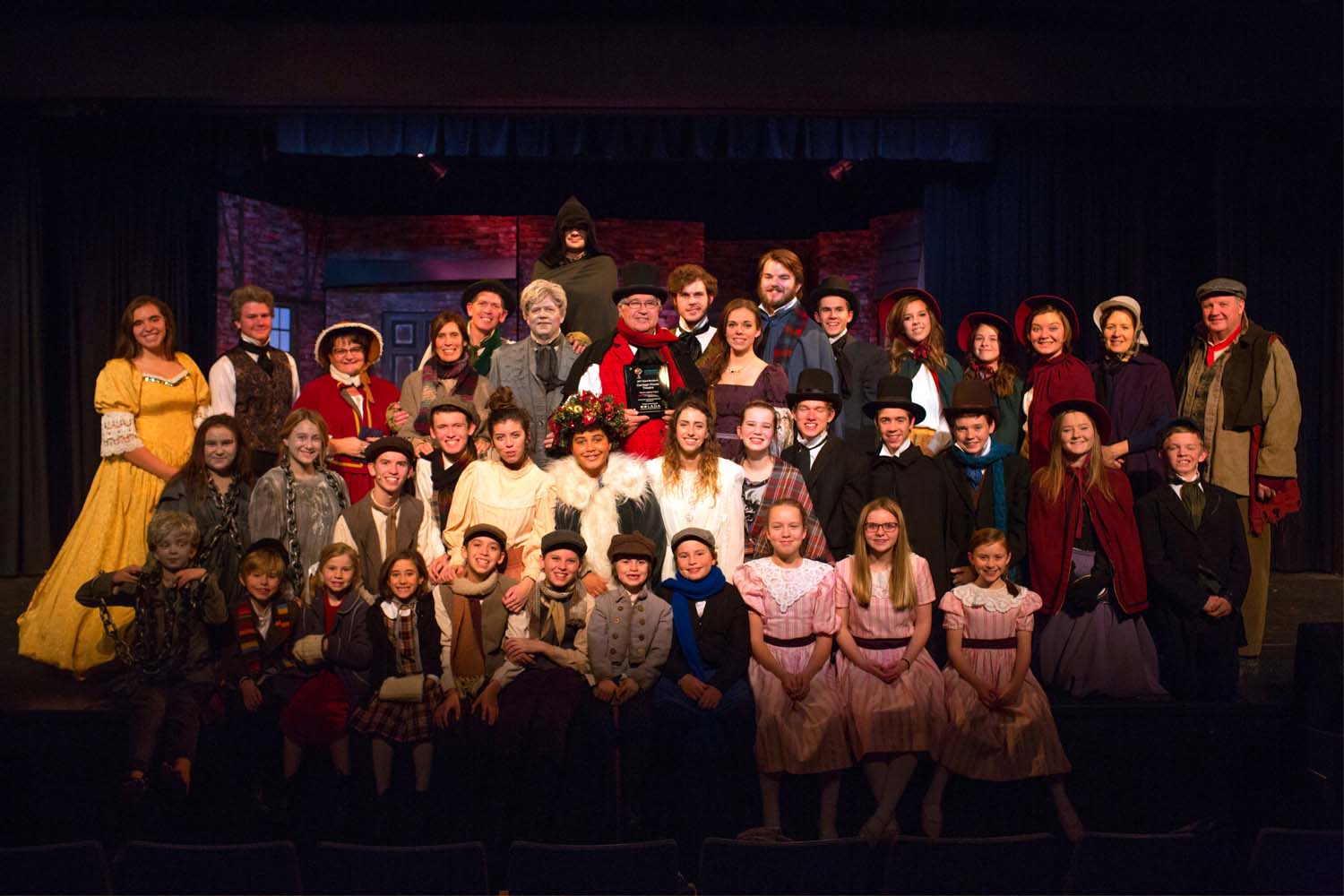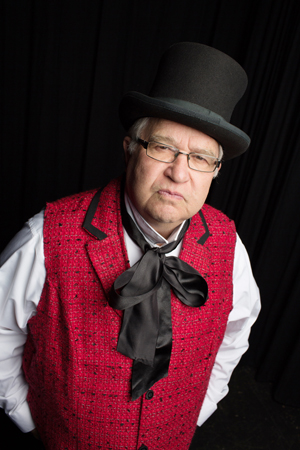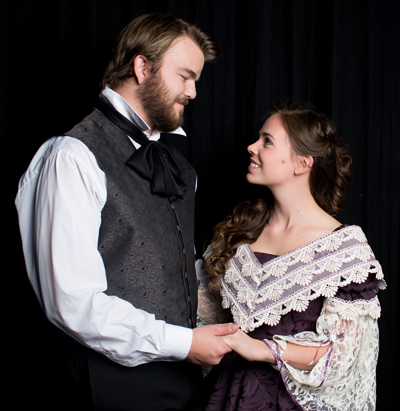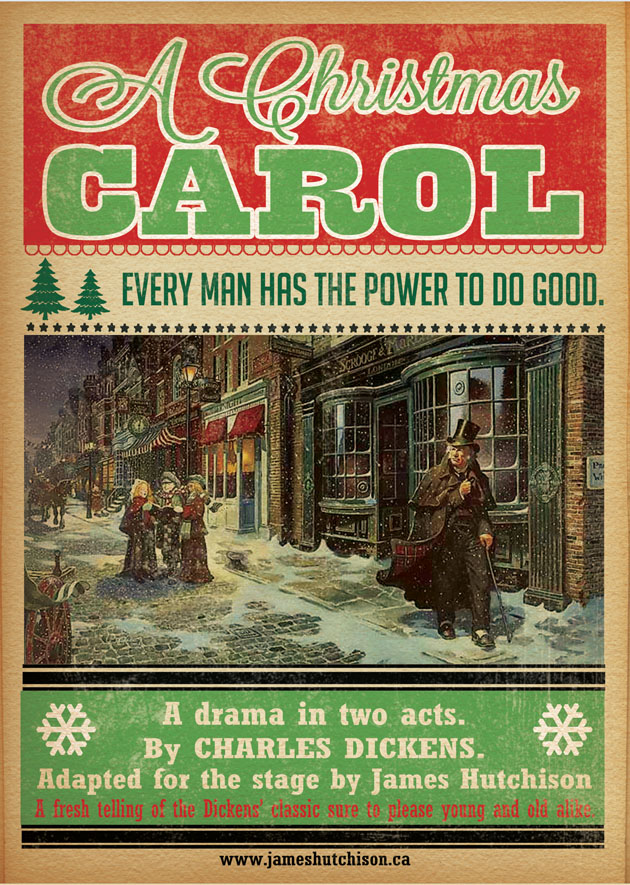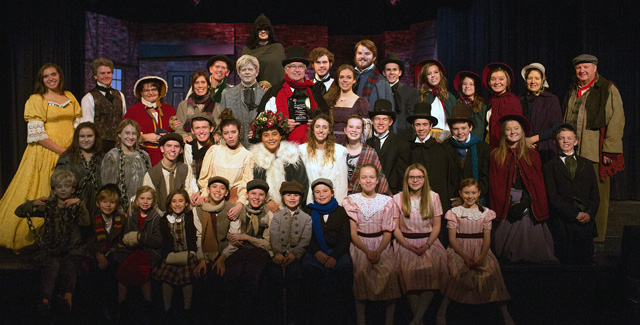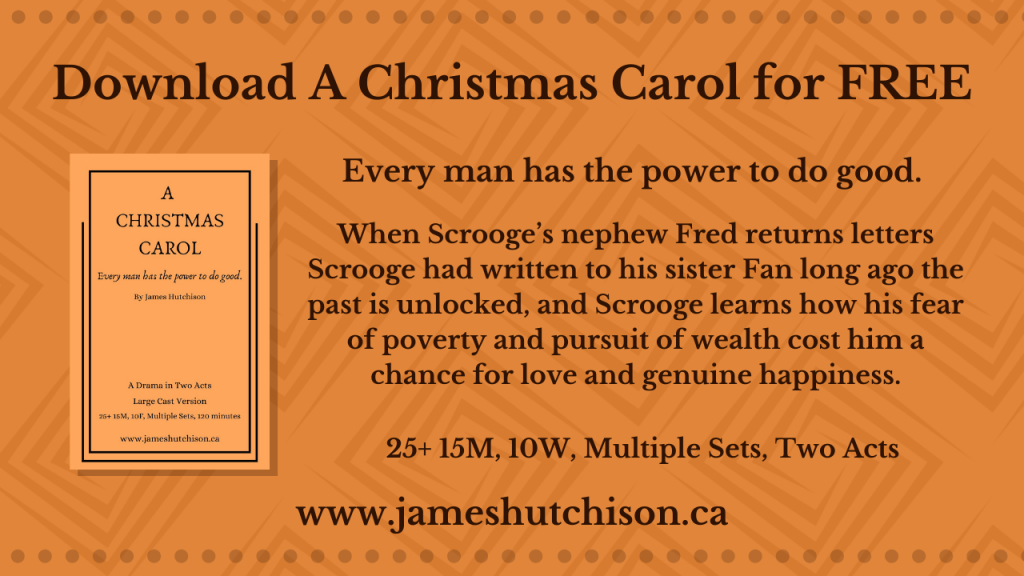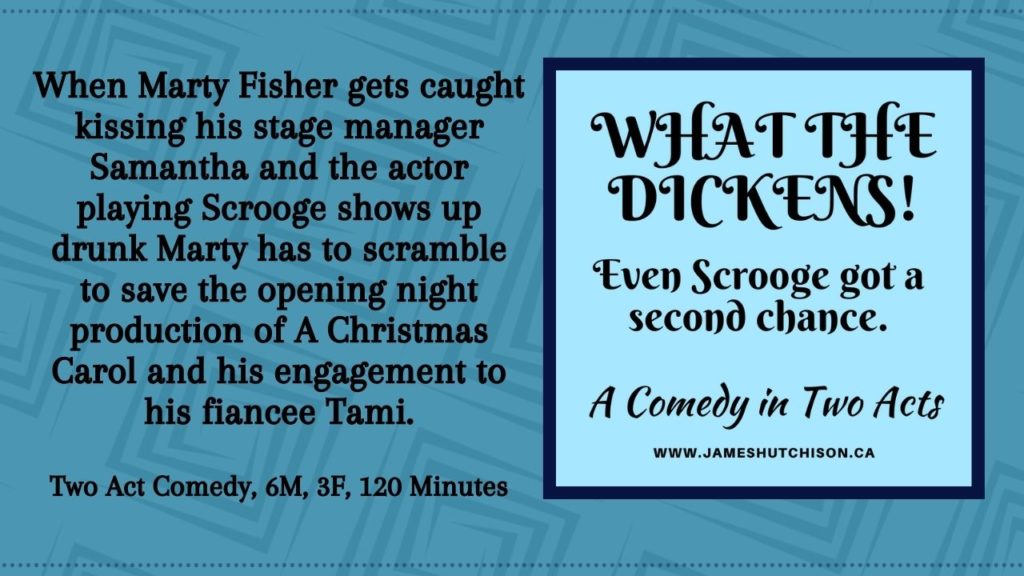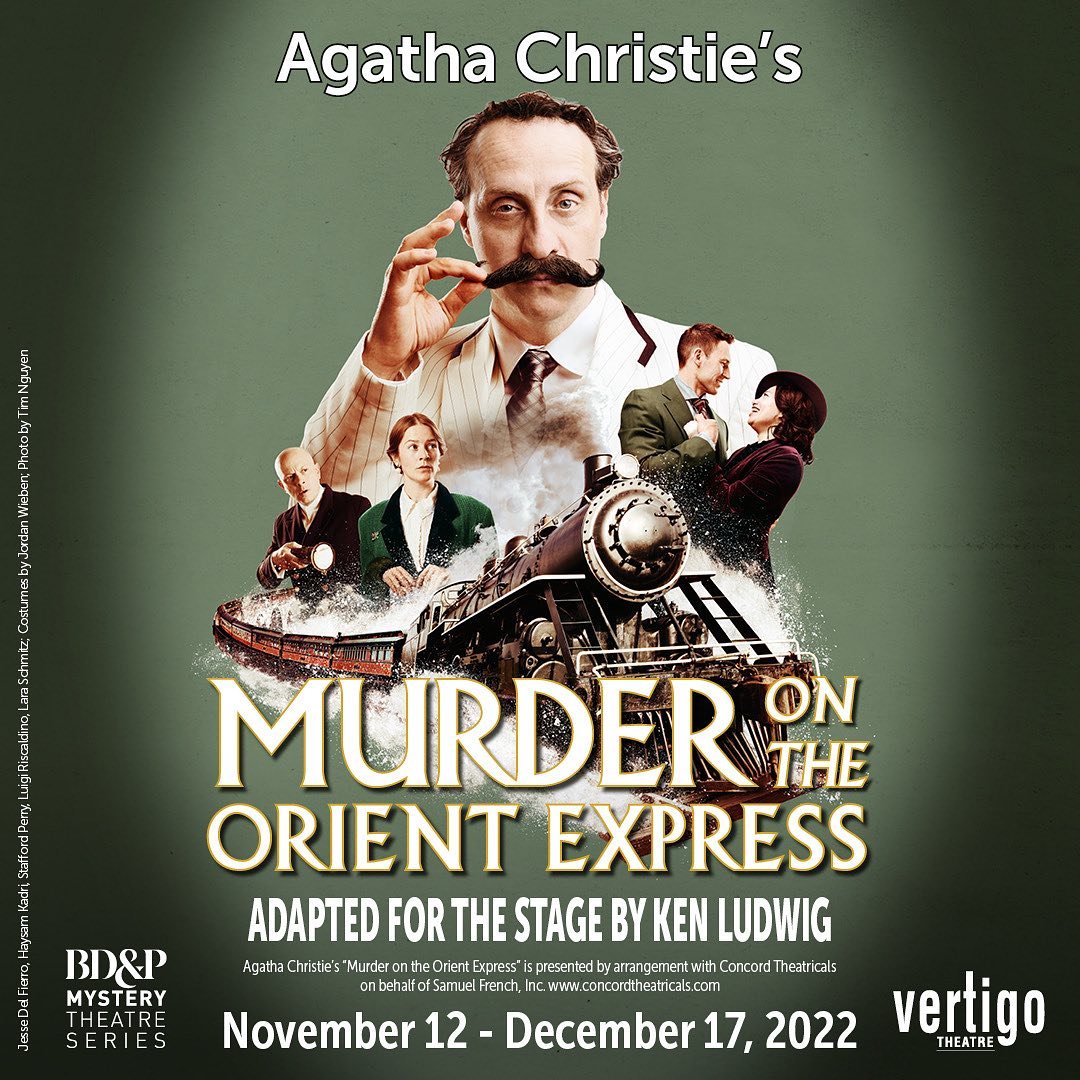

Murder on the Orient Express at Vertigo Theatre is a masterful and thrilling production of the Agatha Christie classic cleverly adapted for the stage by Ken Ludwig.
***
Everything is not as it seems. That statement has never been more true of a murder mystery than in Agatha Christie’s Murder on the Orient Express. Hercule Poirot finds himself surrounded by an eclectic assortment of characters including wealthy American businessman with a shady past Samuel Ratchett, the elderly Russian Princess Dragomiroff forced to live in exile, and the overbearing, loud, and life of the party Mrs. Hubbard, an American. Before the train can reach its destination, it is stopped by a snow drift in the mountains and during the night one of the passengers is murdered!
Poirot is assigned the task of investigating the murder by his friend and manager of the railroad Mousier Bouc who is also travelling on the train. There’s an abundance of clues. An abundance of suspects. And only Hercule Poirot can untangle the web of deception and decipher all the clues to figure out his most baffling and morally challenging case.
Vertigo Theatre takes you along for a thrilling, fun, and intriguing murder mystery featuring a terrific cast including Haysam Kadri as Hercule Poirot. I sat down with the director of the play Jovanni Sy who is also a playwright and actor to talk with him about Murder on the Orient Express, what makes the mystery genre so popular, and how he came to play Mr. Miyagi in the premiere of The Karate Kid – The Musical.
JAMES HUTCHISON
The murder mystery is a popular genre of fiction. So, I’m curious what do you think it is about that genre that has such a lasting appeal, and then I’m wondering specifically, why is Poirot such a popular figure? What did Agatha Christie stumble upon or deliberately design to make Poirot the much beloved and popular character that he is?
JOVANNI SY
I have a theory. I think people love mysteries because the detective is ultimately a seeker of truth. It’s solving a puzzle but it’s also trying to uncover the truth in the face of all your adversaries trying to inundate you with lies. There’s something really appealing about that, about being able to weed through all the deception, weed through all the artifice to uncover a nugget of truth.
And as for Poirot, I think people love him because he’s a showman. He’s so idiosyncratic. One of the really interesting things about the whole detective genre is that we get to know most well-known detectives on a reasonably superficial level. The story is not about their journey to get from point A to point B and learn something along the way. It really is a plot-driven genre, so people will like mysteries in as far as the mystery is compelling and good.
I don’t think Poirot would’ve been a popular detective if Christie weren’t extremely adept at constructing these wonderful puzzles for him. We know his characteristics, but they’re all rather external. They’re about his vanity or his pomposity or his strict moral code. But he doesn’t often undergo a dramatic journey the way protagonists in other genres do. It’s really about how good is he at solving the mystery.
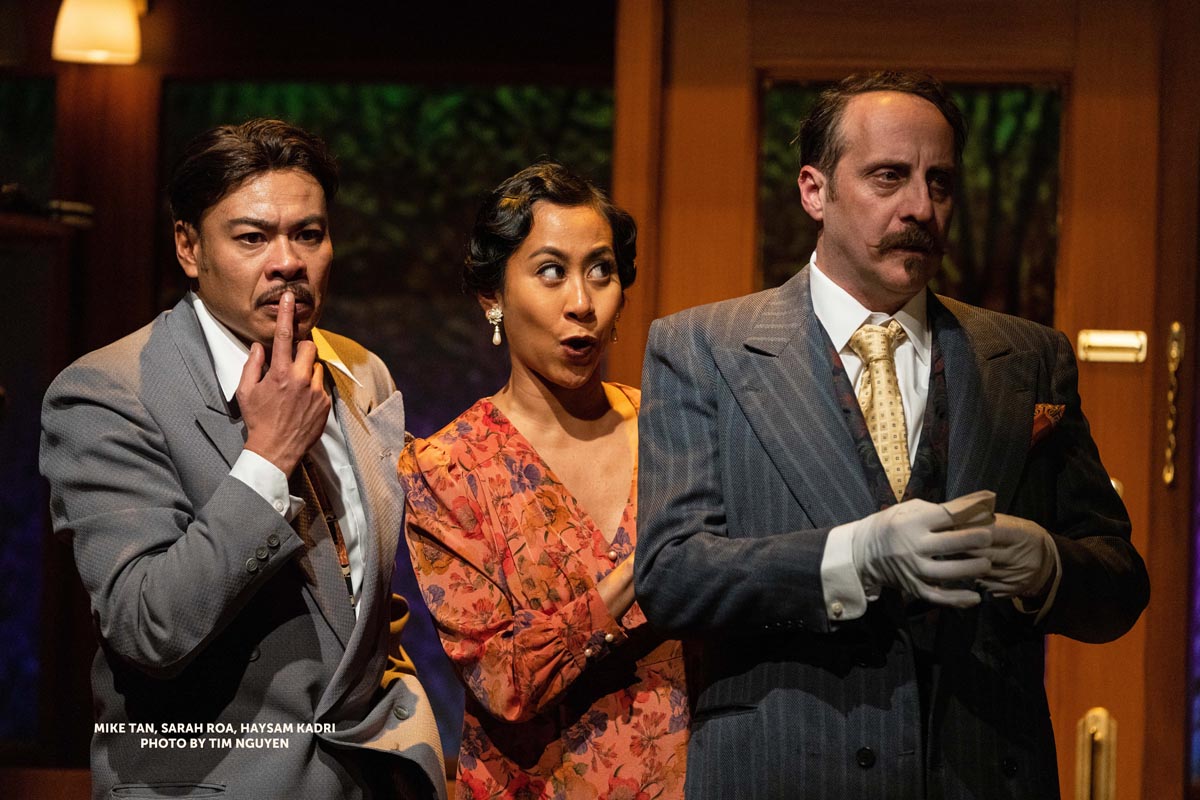
JAMES
In this production, you’ve assembled a stellar cast including Haysam Kadri who is portraying Poirot. What do you think are the qualities Haysam brings to his portrayal of Poirot and as the director of the play how much of that is the director’s vision and how much is the actor’s vision? How did that collaboration work on this production?
JOVANNI
What Haysam brings, other than being a superlative actor is real fierce intelligence. He’s really good at thinking through the text. I mean, I think it’s no surprise he is the artistic director of The Shakespeare Company, and you know for most interpreters of Shakespeare you really need a very rigorous sense of diction and thought. Thought and text have to be aligned and with Shakespeare it requires a real cerebral kind of technique.
And I think approaching the character ultimately, it’s him. He’s the guy doing it. I think where I help is early on in rehearsal, I felt he was doing a wonderful job right off the top, but it felt like his Poirot had a more Sherlock Holmes kind of rhythm to him. Because, you know he’s done such a wonderful job of playing Holmes where everything was super direct, and Holmes is like tunnel focused and everything is to get to the point. Poirot’s not like that.
Poirot is a hedonist. Poirot loves his rich food and his expensive wines and beautiful women. And he is a bit of a showman. In Ludwig’s text he has a lot of stuff where Poirot’s constructed something like the way a magician would present a trick – you sit there and in a second I will show you – this! And he constructs a lot of reveals in a very ostentatious almost vaudevillian kind of way.
So, we almost had to slow down Haysam’s motor. I think his own personal motor is probably more closely aligned to a Holmes-like character who is super fast, super cerebral, super to the point, and instead have him sit back and really enjoy the indulgences of a Poirot and the way he enjoys unfurling the mystery for you in a very showy manner.
JAMES
You know, it’s interesting too with Poirot being as you mentioned a hedonist that perhaps he is more in touch with the psychology and motivation of his suspects.
JOVANNI
Absolutely. I think you’re quite right. Whereas Holmes is much more evidence-driven, science-driven, and data-driven with his kind of process Poirot is about constructing the mindset of the killer. He definitely looks at a murder scene and thinks, “Is this a tidy or an untidy kind of killing? What frame of mind were the perpetrator or perpetrators in? Were they in a hurry? Were they enjoying themselves?” He really tries to pinpoint the psychological makeup and motivators for any kind of crime and match that against his range of suspects. Whereas Holmes is practically on the spectrum where he observes a lot but misses things about the way people work because he’s clinical and robotic in his approach.
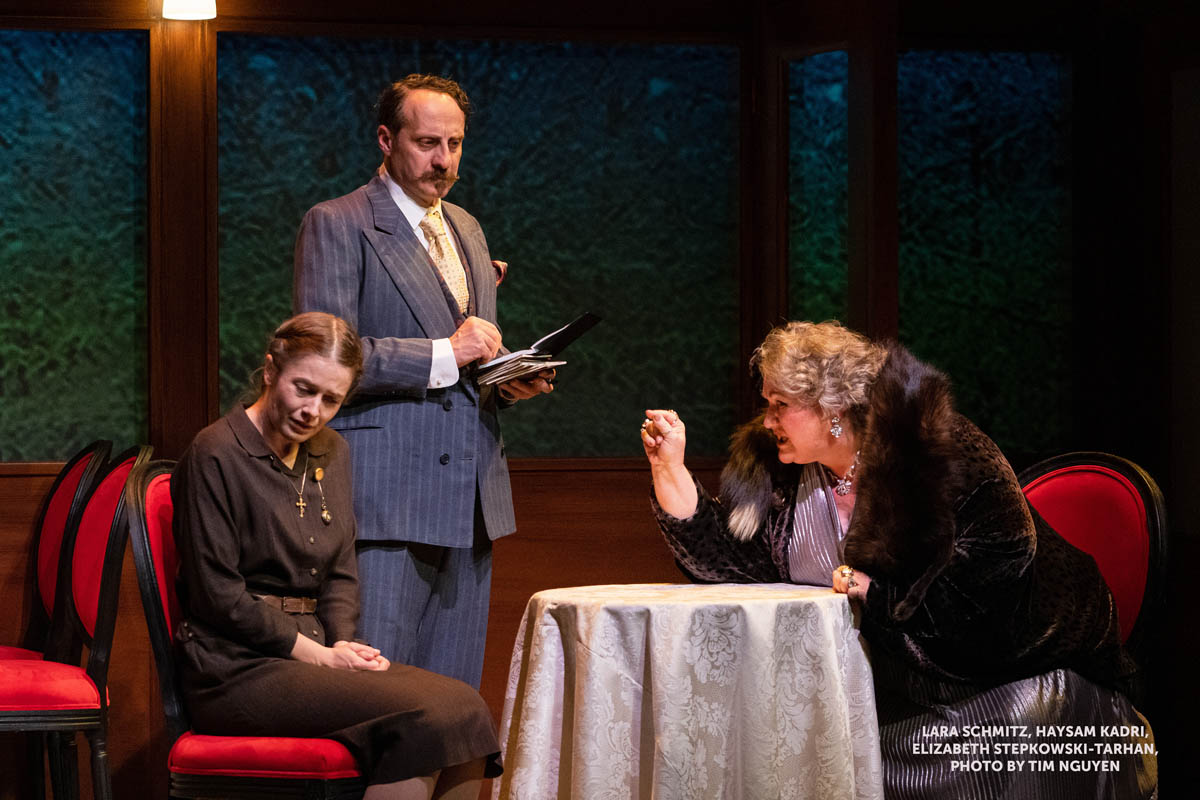
JAMES
One of the interesting things about Murder on the Orient Express is of course the setting because the play takes place on a train, and that certainly provides challenges for your set designer, Scott Reid and your actors. But it’s also fun to see on stage. Can you talk a little bit about the set design and what it was like to create that world and put the characters into it?
JOVANNI
It has its inherent challenges. Some things are really hard to circumvent as in Ratchet’s sleeping compartment must be next to Mrs. Hubbard’s on one side and Poirot’s on the other. You can’t really get around that. I think the geography of the crime is pertinent to its uncovering. So, some things are set in stone.
It’s a challenge because a train is a confined space and I think we leaned into it as much as possible. We didn’t try to do an abstract representation where a train corridor could suddenly easily accommodate the five people who needed to be in the corridor. So, you know, in that scene where they’re all passing each other, we just leaned into how even in the most luxurious train on earth you still have a problem if it gets crowded when you try to pass each other in a corridor. Or when you have nine people in a room that is literally three by five how do you stage that?
It was tricky and it takes a lot of precision so that people aren’t blocking each other. Fortunately, the sight lines are good. Scott created some really smart conventions like being able to see through the walls from the rooms to the corridor and having walls implied but not completely filled out.
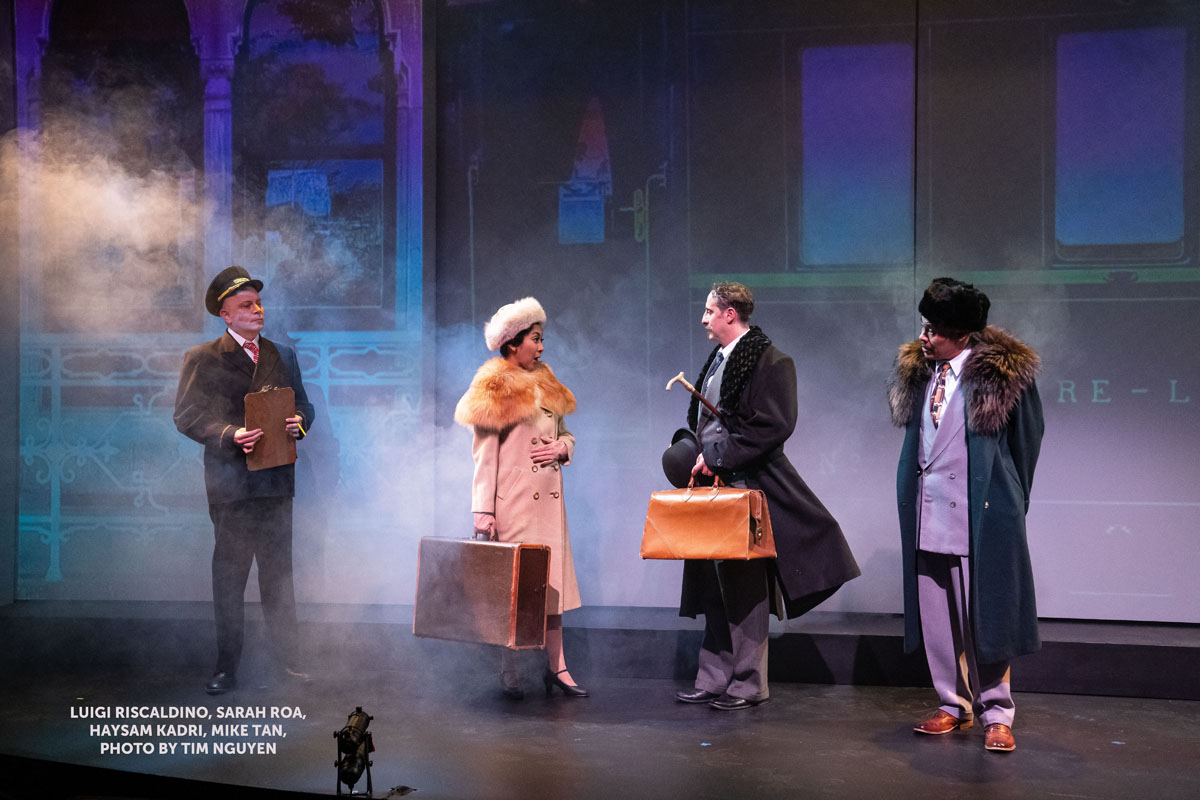
JAMES
So, I want to talk a little bit about another iconic character because you’re also an actor and earlier this year you were in the world premiere of The Karate Kid – The Musical, and you played Mr. Miyagi, who in the original movie was played by Pat Morita. What was it like to work on that show and become part of the DNA, so to speak, of Mr. Miyagi?
JOVANNI
It was surreal is the only word I have for it. I mean, that was such an iconic movie for me. I was sixteen when it came out. And, Pat Morita, you have to understand, was like an idol to a whole generation of Asian performers, because we were so underrepresented. There were so few figures in television and film that weren’t the stereotypical background kind of guy who was a buffoon or an idiot or just inconsequential. Mr. Miyagi had power and agency and dignity and humour and pathos and Pat Morita did an incredible job. He got an Oscar nomination. So, he’s an iconic figure to so many Asian performers and artists of my generation and subsequent generations.
So, to walk into his shoes was daunting because he created a character that everybody knows – everybody loves, and the challenge was how to interpret it and make it my own and not try to just copy him because I couldn’t even if I tried. Even if I just wanted to say, “Hey, let me just crib, everything Pat Morita did.” I’m not Pat Morita. It wouldn’t work. And, in the end, what made it even more surreal was Ralph Macchio, William Zabka, and Martin Kove they all came out to see the show in St. Louis. Talk about meeting your idols. So, it was an incredible experience.
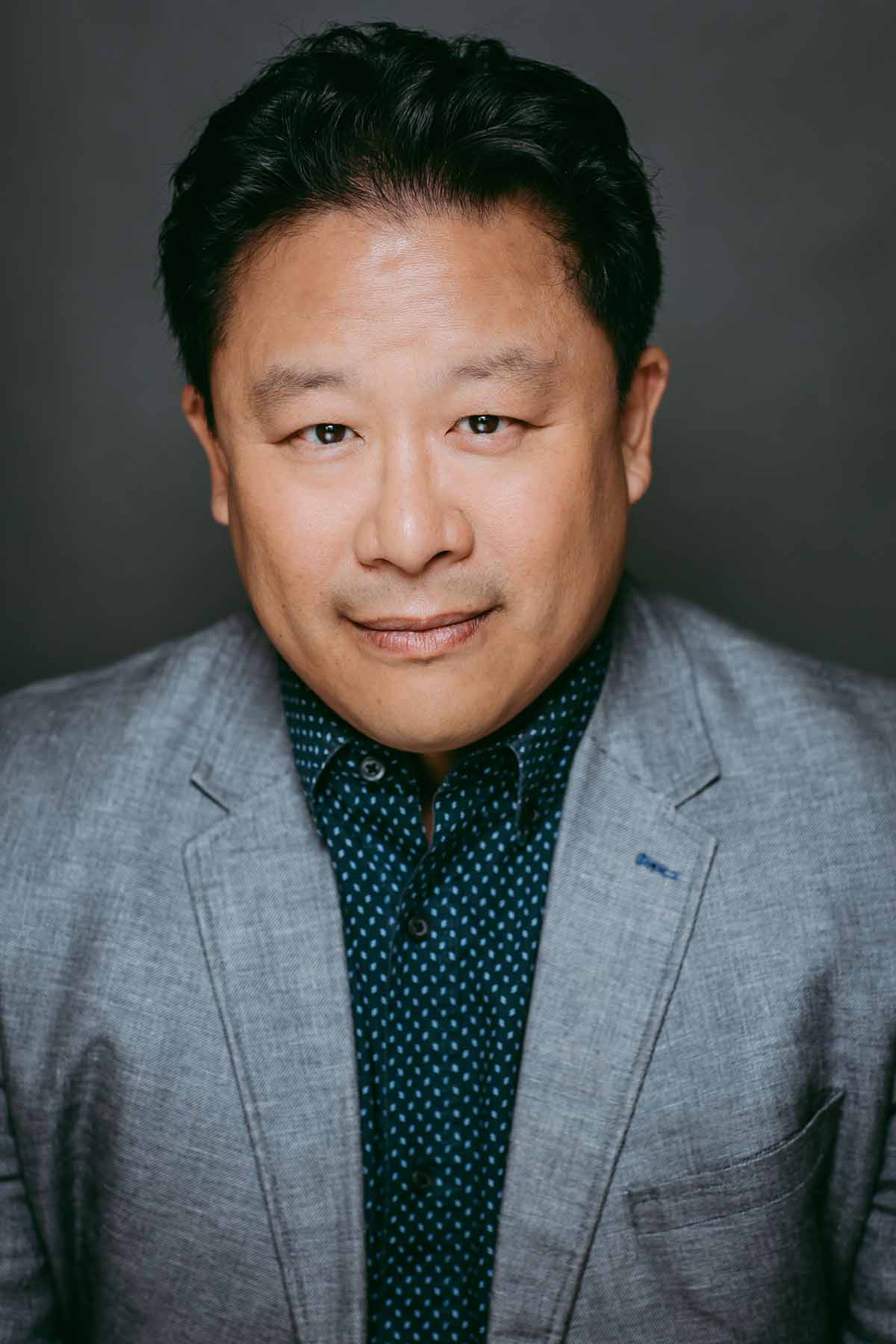
JAMES
I did read somewhere that there are plans for Broadway. Is that correct?
JOVANNI
It’s still in the works. I think if it happened it would probably happen in 2024, but you never know. It could happen. I hope it does. I would love to do that show again.
JAMES
Is that an ambition of yours to get on the Broadway stage?
JOVANNI
You know, it wasn’t. I’m pretty happy with my career in Canada. I mean it’s not an ambition in the sense of one that I would say I actively pursued. There are musical theatre specialists who move to New York, and they’re clearly working towards that trajectory. So it was, I would say more of a fantasy than an ambition. I thought about it the same way I thought it would be great to play shortstop for the Jays, you know, it’s just in the back of my mind. I took no concrete steps to get there. It just sort of happened. But would it be great to be on Broadway? Yeah.
JAMES
I understand that when this opportunity first came up you were busy with a lot of other things and you went, “Nah, I’m not going to do it.” But your wife, Leanna Brodie, had some good career advice for you.
JOVANNI
That’s absolutely true. When I got the call I was directing my thesis play at the University of Calgary. I had just started. I was at the busiest I could have been and I was also scheduled to direct a show in Winnipeg around the time that Karate Kid would’ve happened. So, I thought, you know, I already said I’d do something else, but she said, “Look your friend would understand if you got this. You could pull out of your directing commitment.” Which I ended up doing. But she told me, “If you’re going to do it, don’t just do it half-ass. Do a good job.” And I listened to her. I actually really worked on the video audition. I sent it in still thinking this is ridiculous. There’s no way. But it happened. It just happened and I almost didn’t bother submitting because I thought I’m too busy. Leona is the smartest person I know and always gives very good advice.
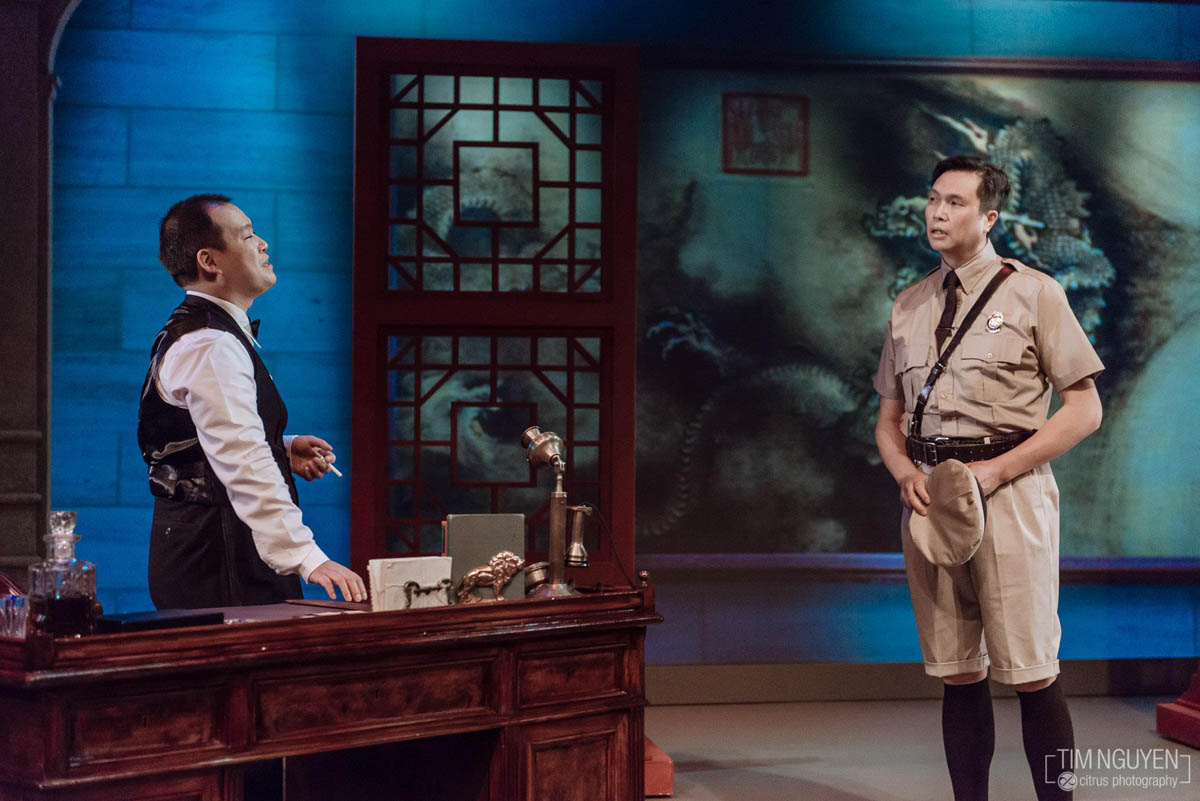
JAMES
You’re an actor, director, and you’re also a playwright. Your very own mystery, Nine Dragons, premiered on the Vertigo stage in 2017, which I saw, and I really liked. The story follows Chinese Detective Tommy Lam in 1920s Hong Kong, while he investigates the deaths of several women, and he finds himself battling racism and he risks losing his career, reputation, and maybe even his life. So where did the inspiration for that story come from and what does the future hold for Detective Tommy Lam?
JOVANNI
The funny thing is, I had an image of Tommy’s foil the character Victor Fung, first. I think I saw a picture of a Chinese man in a beautiful tuxedo looking very Noel Cowardesque and I thought, what an interesting man, who is he, why is he dressed like this? And I thought of a Victor Fung like character and I’ve always loved mysteries so the idea to make it noiresque and set it in 1920s Colonial Hong Kong came early.
I was working on this piece in Toronto before I moved out to Vancouver in 2012, but I ran into Craig Hall the artistic director of Vertigo Theatre at a conference in Calgary and we talked about this piece I was writing and he thought, that sounds really interesting. And Craig has his own connection to Hong Kong, and he’s been to Hong Kong a number of times. So, that’s how it started. That’s the connection to Vertigo and why it premiered there. It wouldn’t have happened without Craig.
And what’s in store for Tommy? Craig actually commissioned a prequel, which is another Tommy Lam story that takes place about thirteen years before Nine Dragons. So, we’re talking 1911, Hong Kong and I started working on it. And it may have a future at Vertigo. Jack Grinhaus the current artistic director of Vertigo Theatre and I have been talking about it but it’s early. We’ll see.
JAMES
You know, you’re writing plays and you’re creating this character have you ever thought of writing some Tommy Lam mystery novels? You could write a whole series.
JOVANNI
I haven’t. But you know I love that genre and if I were to turn to long-form fiction, I think I would go in the mystery direction.
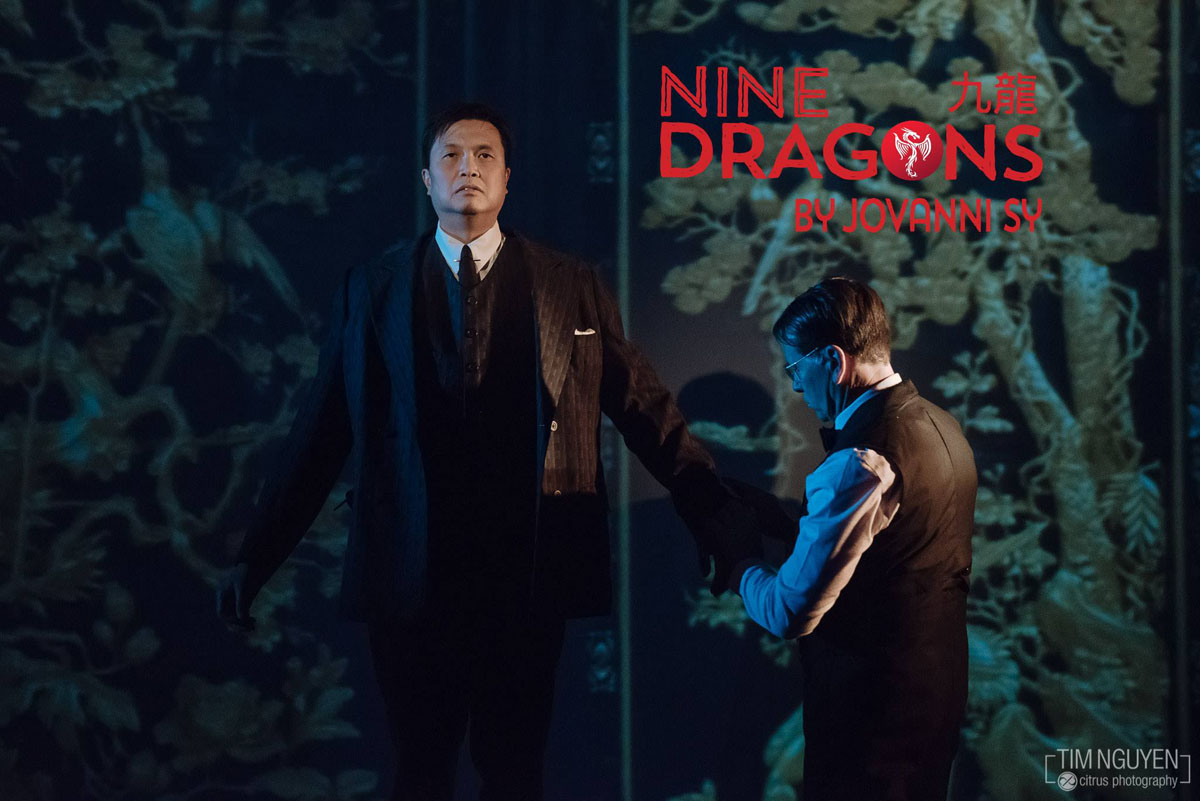
JAMES
So, you not only write mystery, but you also write comedy and congratulations are in order because you recently won the Playwrights Guild of Canada Comedy Award for your play, The Tao of the World. And it’s a free adaptation of William Congreve’s Restoration comedy, The Way of the World. Your modern version takes place in Singapore, and it’s two years after a pandemic and the wealthy elite are making up for lost time by hatching schemes to bed other people’s partners and to swindle each other out of their dynastic fortunes. What’s the story behind the creation of that work?
JOVANNI
It’s really weird. I was at the UofC doing my MFA in directing and I needed to direct a thesis play. It kind of happened coincidentally because I was working on this Nine Dragons prequel which is a totally different beast and I had plans to direct this other play, a Brecht piece and then the faculty had some reservations about the viability of doing that piece so they suggested I do something else. And somebody said, “You know, we’re in the middle of COVID, we could use some laughs. Have you thought about doing a comedy?”
So, I thought, I’ve always loved Restoration comedy. I remember seeing a bunch early in my career and being a fan of a number of them. And I started looking at them and I thought about The Way of the World, but I thought at the same time, how can I take this established piece and try to reinterpret it from modern times because there’s something interesting about a new definition of restoration.
The Restoration comedies are all about the restoration of the monarchy after Cromwell. You know, the years of the Republic. So it’s the restoration of the monarchy coming in because most of the English royalists had been exiled in France. But what does restoration mean today? And to me it really meant the restoration of everyday life after we’ve been shut down.
I started working on it right in the middle of COVID when we were still working remotely, learning remotely. Masks were mandatory. Social distancing was mandatory. And so, what would it be like after COVID? Because I imagine the rich and wealthy would be just as naughty post-COVID as they were post-restoration of the monarchy, there’d be a kind of a giddy bawdiness and licentiousness.
And of course, I wanted to set it in an Asian setting because that’s what I’ve done with a lot of my works is try to recenter the experience to interpret it to a modern audience that includes Asians but doesn’t exclude everyone else. So that’s how it came about and was set in Singapore. It was almost like an experiment that just went really, really well.
JAMES
So, you know, it’s funny you mentioned needing a play and then this comes along. How much of your work do you find is just having the practical thing that you need and then inspiration strikes?
JOVANNI
That happens more often than you’d guess. I hadn’t even thought of it that way. Thank you. Wow. That’s a real, Aha! Yeah. I think it’s born of pragmatism first then the inspiration comes later. Or you know, not even inspiration. It’s like, I’ve got something to solve, so how do I solve it? I’m almost a believer that inspiration’s overrated and that if you frame creativity as a series of puzzles to be solved where you can define the parameters what you would call inspiration comes afterwards because you’ve had something active to work on.
Which is why I love writing in genre. I love the mystery genre. So, genre can actually be liberating because it sets the parameters for you and gives you something to do so you don’t have time to worry about do I have some kind of divine inspiration? You’re just trying to crack a knot, right?
JAMES
Inspiration is problem-solving.
JOVANNI
Yeah.
JAMES
We read mysteries, and we watch them on TV or at the movies, but there’s something extra fun and engaging about going to the theatre and seeing detective fiction. What makes the stage such an ideal and fun medium for experiencing a who-done-it and what sort of fun are audiences in for when they come to see your production of Murder on the Orient Express?
JOVANNI
I think first, it’s ultimately a fair test because you are literally, as an audience member, seeing everything exactly the same as the detective is seeing it. Everything that’s happening is happening in front of your eyes. There are no edits. There’s no selective choosing of things. You are solving the mystery at the same rate and with the same details that the detective has. So, it’s fair.
But the other thing is the implication that you can experience a surprise. The gasp. It’s happening right in front of your eyes – the mystery or shock, or unexpected bit of violence, or an unexpected bit of mayhem – it’s so immediate. And I think that’s why the stage is one of the best places to see mystery because it’s a visceral thing. You get that immediate connection when reading a mystery but it’s not in front of your eyes. You’re not seeing blood or a flash of light or hearing a sound that resonates to your core. So, if you’re going to see Murder on the Orient Express, you’re in for a literal ride. It’s like a train ride. You feel like you’re there on the train confined with the passengers and there’s a sense of danger and a sense of fun.
***
VERTIGO THEATRE presents Agatha Christie’s classic
MURDER ON THE ORIENT EXPRESS
Adapted for the stage by Ken Ludwig
Agatha Christie’s MURDER ON THE ORIENT EXPRESS features Haysam Kadri as Hercule Poirot, Luigi Riscaldino as Michel the Conductor/ Head Waiter, Stafford Perry as Col. Arbuthnot/Ratchett, Jesse Del Fierro as Mary Debenham, Elinor Holt as Mrs. Hubbard, Alexander Ariate as Hector MacQueen, Mike Tan as Monsieur Bouc, Elizabeth Stepkowski-Tarhan as Princess Dragomiroff, Lara Schmitz as Greta Ohlsson and Sarah Roa as Countess Andrenyi.
MURDER ON THE ORIENT EXPRESS is Directed by Jovanni Sy, Assistant Direction by Camryn Hathaway, Set & Projection Design by Scott Reid, Costume Design by April Viczko, Assistant Costume Design by Katriona Dunn, Lighting Design by Jonathan Kim, Sound Design & Original Composition by Andrew Blizzard, Assistant Lighting Design by Tauran Wood, Fight & Intimacy Direction by Brianna Johnston, Stage Management by Donna Sharpe, Ashley Rees, and Raynah Bourne.
